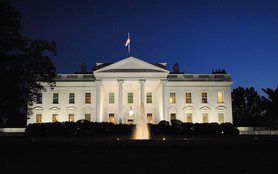No matter where or how you live in this world, we all deserve to be treated equally and with dignity and compassion. We all deserve the same basic rights, from a livable planet to food and shelter, education, and healthcare.
This fight for dignity is more important than ever. The COVID-19 pandemic has shown us how our gravest challenges in the US are often the same challenges people face around the world. Racism, economic inequality, pandemics, climate change, the refugee crisis: these issues can only be solved if we stand up for the equal rights of every person and commit to seeing and reaching beyond our borders.
At tonight's presidential debate, President Trump and Vice President Biden will make the case for their plans and ultimately, their vision of what our country should be. Here are the five questions we would ask them if we were moderating:
1. Will you champion a people’s vaccine that is free, fair, and available for all?
Safe and effective vaccines offer a way out of this nightmare. Scientists are working around the clock to find a solution, and we, the American taxpayers, are funding the effort. In fact, more than $10 billion of our tax dollars have been invested in finding a COVID-19 vaccine; yet, there is no guarantee that drug companies will ensure the vaccine is affordable and available to all who need it, particularly frontline workers and those most at-risk.
Development and approval of a safe and effective vaccine is really just the first step. That's why we need a people’s vaccine, which would provide immunity as a global public good, free of charge, fairly distributed for all. We must collaborate with other world leaders to deliver a fair and equitable global distribution plan while ensuring that no one company or country maintain monopoly control over it and its production.
2. How will you put working people at the center of the COVID-19 economic recovery?
The pandemic has wreaked havoc in our economy with disproportionate impacts on working people, especially women and Black Americans. Half a billion people are expected to be pushed into poverty by the economic fallout from COVID-19. Meanwhile, a small set of large corporations and extremely wealthy investors have profited massively off of the crisis. The 25 wealthiest billionaires globally increased their wealth by a staggering $255 billion between mid-March and late-May alone.
Transformational measures to rebuild the economy must be prioritized to help working people keep a roof over their heads and feed their families. Such policies include direct cash assistance, supplemental unemployment insurance tied to the unemployment rate, Supplemental Nutrition Assistance Program (SNAP) expansion, an essential workers bill of rights, and transparent, accountable payroll protections. Paid sick and family leave, support for the care economy, and measures that ensure gender equality are critical.
3. How will you tackle climate change?
Devastating wildfires in Oregon and California, a frightening derecho in Iowa, huge locust swarms, and widespread flooding in East Africa, and deadly cyclones in India and Bangladesh, have continued to remind us that the climate crisis is continuing even as we’re battling a COVID-19 crisis.
But the COVID-19 crisis has shown us that governments can ramp up dramatic emergency actions in the face of a crisis—if they choose to. Our leaders have a historic but final opportunity to start building fairer economies within the limits of our planet, creating decent jobs that people need now, and strengthening the resilience of the most vulnerable to future shocks, all while recovering from the economic damage wrought by the pandemic.
4. What is your plan to deliver opportunity to all, not just the privileged few?
COVID-19 has exposed dramatic inequality in our country, and shined the light on persistent and pervasive racial disparities. Black Americans outpace their white counterparts in virus infection and death rates while possessing 10 times less wealth to weather the unfolding economic recession. The median white family in America has 41 times more wealth than the median Black family. Black Americans are disproportionately represented in the low-wage workforce. The federal minimum wage has not been raised in over a decade; $7.25 per hour is currently a poverty wage. While 27 percent of the total US workforce would benefit from raising the federal minimum wage to $15 per hour, 38 percent of Black workers would benefit (nearly seven million people and their families).
Urgent action is needed to financially stabilize Black households in the near term and pursue a policy agenda that closes the multi-generational racial wealth gap. The time has come for a $15 per hour federal minimum wage, paid sick time, and paid family leave for all. Americans need health care, education, and programs that create economic opportunity for marginalized people.
5. What will you do to crack down on tax avoidance by wealthy Americans and large multinational corporations?
Tax dodging is one of the most important drivers of economic inequality globally. It’s a key reason the world’s billionaires have more wealth than the 4.6 billion people who make up 60 percent of the planet’s population.
Every year, about one out of every six dollars owed by individuals in federal taxes is not paid. That amounted to roughly $600 billion in federal taxes dodged in 2018. By comparison, the US defense budget that year, the largest by far globally, was $700 billion. Multinational companies use offshore tax havens to dodge an additional $100 billion in US taxes every single year. When big companies and the wealthy avoid taxes, average people suffer. They suffer in lost health care, reduced school funding, crumbling roads and bridges and even higher middle-class taxes. It’s time we finally put an end to tax dodging by the rich and powerful.



